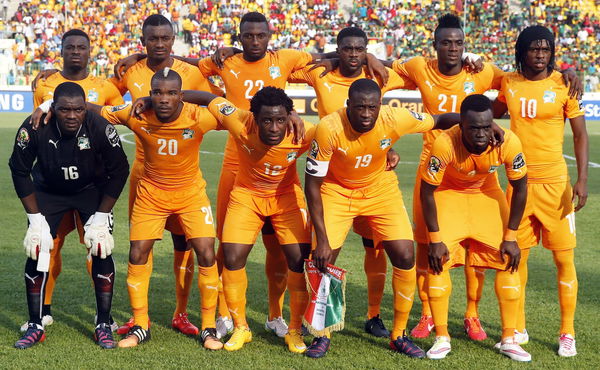
via Reuters
Ivory Coast national soccer team players players pose for a photograph before the start of their Group D soccer match against Guinea of the 2015 African Cup of Nations in Malabo January 20, 2015. REUTERS/Amr Abdallah Dalsh (EQUATORIAL GUINEA – Tags: SPORT SOCCER)

via Reuters
Ivory Coast national soccer team players players pose for a photograph before the start of their Group D soccer match against Guinea of the 2015 African Cup of Nations in Malabo January 20, 2015. REUTERS/Amr Abdallah Dalsh (EQUATORIAL GUINEA – Tags: SPORT SOCCER)
Despite remaining one of the most under-appreciated continents in terms of football, Africa has managed to provide us with some phenomenal players who have never gotten the recognition they deserve. From a rather humble beginning, the CAF (Confederation of African Football) has grown rapidly and as an organisation, is well respected in its field of business. It would be wrong to state that African Football has not taken the lead where necessary and has not grown in all its length. In 1978, Tunisia became the first African side to win a World Cup game, beating Mexico. In 1982, Cameroon went home unbeaten, edged out on goals scored by Italy after drawing all three group matches. Algeria beat West Germany but was eliminated on goal difference after the farce of Gijón as Austria and Germany settled on a result that took both through. In 1986, Morocco became the first African side to reach the second phase. These statistics, and many others like them, emphasize how African football will never stop developing but something holds them back, still.
When South Africa hosted the 2010 FIFA World Cup, everyone was certain that African football would now make its presence felt on the global stage but sadly, even though the hosting of such an important event was considered the apex of African football, out of 6 African teams, only Ghana managed to qualify from their group before losing to Uruguay in the quarter-finals; “They can play, but they can never win” was the phrase used to describe African football, having failed to perform well when expected the most.
ADVERTISEMENT
Article continues below this ad

via Imago
George Weah remains the only African to win the Ballon D’Or and the FIFA World Player of the Year Award, winning both in 1995
Footballers such as George Weah and Tony Yeboah and, more recently, Yaya Toure and Samuel Eto’o, have lit up the European leagues with their astonishing ability; however, the style of play cultured in Africa, visible both in our leagues and on the international stage, has added much more to the game. The power, directness and, most important of all, competitiveness of countries such as Ghana and Cote D’Ivoire has added an extra element to the World Cup that could not be found several decades ago, when perhaps the most vivid memory of African football is the poor showing of Zaire at the 1974 World Cup in West Germany which can’t be forgotten even in today’s age and time.
ADVERTISEMENT
Article continues below this ad
‘Lack of talent’ is not really the problem as much as ‘lack of opportunity’ and poor coaching is. Gone are the days when football scouts would roam the African cities looking for the gifted ones but now a days the focus is not, primarily, on developing high-class footballers. The focus is on commanding enrolment money from families who can scarcely afford to pay. Consequently, potential professionals can no longer move up the development ladder at home. Budding Ivorian professionals are increasingly taking their chances in footballing backwaters in the hope of one day making it to Europe. The likes of Didier Drogba and Kolo Toure are not getting any younger. It is not easy to replace quality with quality even with the best infrastructures. Didier Konan will never be as good as Drogba; to some extent it must be accepted that Africa has just lived through its most productive phase of individual quality.
ADVERTISEMENT
Article continues below this ad
The positive spin is that there is a greater breadth of talent in Africa than ever before, that there are now a couple of dozen decent sides and that success isn’t restricted to the usual five or six nations, but the fear must be that the apparently increased competitiveness of African football is less to do with the rest rising than with the big sides collapsing, that this isn’t progress, but a descent into mediocrity.
ADVERTISEMENT
ADVERTISEMENT
ADVERTISEMENT
ADVERTISEMENT

